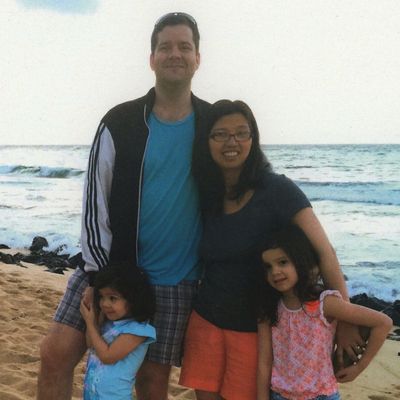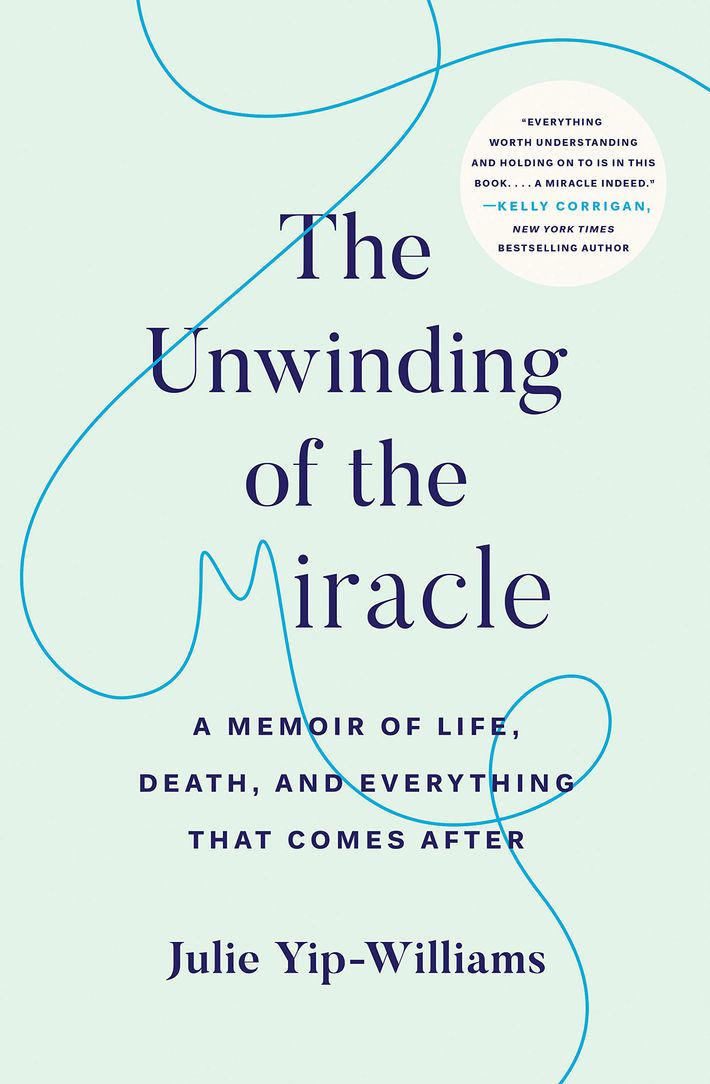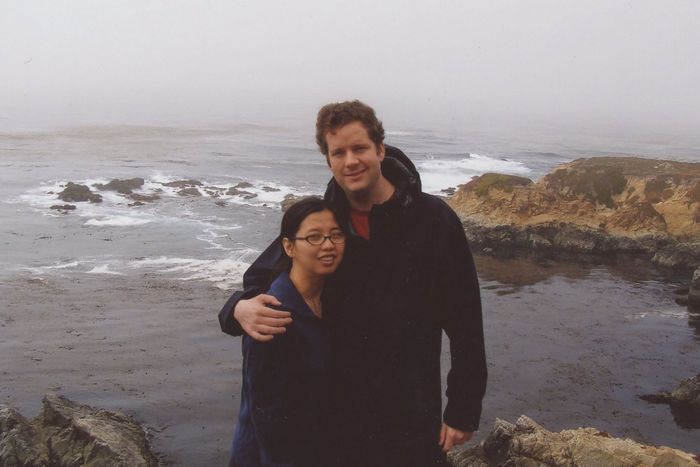
When Julie Yip-Williams was a few months old, her parents almost had her murdered. She was born in war-torn Vietnam with blinding cataracts, and her grandmother insisted that Julie be taken to an herbalist who would feed her a poisonous tincture, thus removing the burden of a helpless girl. But the herbalist spared her, and Yip-Williams went on to escape Vietnam, get eye surgery, attend Harvard Law, marry another attorney, and set up a good life in New York. Then, at 37, she was given a diagnosis of terminal colon cancer. She died four-and-a-half years later, leaving behind her husband, Josh, and two small daughters, 8-year-old Isabelle and 6-year-old Mia.
She also left behind a manuscript and a few years’ worth of blog posts chronicling the confounding reality of facing death in her late 30s, which is published this week as The Unwinding of the Miracle. Yip-Williams recorded the various chemo cocktails doctors prescribed her, the temptation to simply give in and stop all treatment, the forced jollity and fierceness of fellow cancer sufferers, and, most movingly, her attempts to come to terms with the fact that her daughters would grow up without her and her husband might one day find new love.
Over the past few years, a spate of memoirs written by terminal cancer patients have become best sellers: Paul Kalanithi‚Äôs¬ÝWhen Breath Becomes Air;¬ÝNina Rigg‚Äôs¬ÝThe Bright Hour; Cory Taylor‚Äôs¬ÝDying: A Memoir. Readers consider them an opportunity to safely touch the great unknown, to peer into the worst moments of a stranger‚Äôs life and emerge with at least a grain of reassurance that death, according to the dying, isn‚Äôt as scary as we think it might be.
Yip-Williams‚Äôs memoir is different: more raw, less lyrical, and brilliantly honest about the rage that accompanies the physical and emotional pain of a premature death.¬ÝBelow, we get to hear from another uncommon voice ‚Äî that of the bereaved. Josh Williams, who ushered¬ÝThe Unwinding¬Ýto press, spoke with us about the book‚Äôs genesis, his difficulty in sharing Julie‚Äôs story, and the hell of learning that you‚Äôll only get four more years with the person you‚Äôd been planning on living with for the next 50.
How are you and your girls?
Things are normalizing. Julie’s last birthday was January 6, 2018, and she was extremely sick at that time. It wasn’t a joyous occasion — we all knew it was going to be her last birthday. So that came around again a few weeks ago, and that was extremely tough — “the last of the firsts,” if you will.
How did you go about turning what Julie had written into a book?
Before we had children, Julie took six or nine months off and wrote a manuscript, which seemed like a massive undertaking at the time. Probably 150 to 200 pages. She didn’t really [aspire] to commercialize it, but she wrote this manuscript about being born blind. This was long before the cancer. Then life intervened. [The manuscript] sat on the shelf for some years. And then when she got sick she started writing the blog. The book is about 80 percent from the blog, but there’s another maybe 20 percent from this older manuscript. Julie got too sick in the last several months to write it. I deferred to the professionals, but had a hand in shaping it.
At one point in her illness did she sign a contract?
Very late, very late. I want to say the latter stages of 2017. She met Mark [Warren, her editor] after she had made a comment on an article that Mark had written about Stephanie Lee, who was a stage-four colorectal cancer sufferer down in Mississippi.
How did you feel about this book’s publication?
As I said in her obituary, she truly did not have any intention of commercializing this at all. She really felt that much of what was out there was just dishonest — misleading even — and just not particularly helpful. And that there was room in the world for a blog that would actually get into the raw truth.
Julie’s reaction upon hearing that Random House was actually interested in transforming it into a book — I mean, it’s hard to describe. She was just over the moon. She was really sick by that time. I think that is an important part of the story. She knew she didn’t have much time left. I think she was thrilled to be leaving something behind, because she thought it would be useful for people out there who were suffering. But also I think she really, really wanted to leave a tangible legacy, particularly for the kids. They were so young when she died.
Julie writes a lot about being really pissed off. That’s not an emotion people want to talk about when it comes to cancer.
We have an annual family vacation where we get together with my parents, my sisters, and their families. And we decided to do it in 2013, even though Julie had just been diagnosed with this awful disease. We all got together on the outer banks of North Carolina. I remember sitting there with her, all in a state of shock of course, and looking at the blogs that were out there. And being stunned that there weren’t more that were clear and helpful. [We shared] the central mission of wanting to put something out there that might actually be honest, and open, and useful. It was definitely there from the very beginning of her cancer journey. As much as I hate the word journey to apply to cancer.
Journey sounds very friendly. Like you’re going to end up somewhere tropical.
Yeah. It sounds like the blogs that were out there.
Are you protective of the story in some way? So many people will be talking about your wife, the mother of your children.
Oh Lord. Well, look, I don’t want to come off the wrong way, but it’s really hard for me. I’m very proud of her. And I really am very grateful that she got the book deal that she got. I think it’s such a bolt of lightning. She deserved something incredible, especially given the shitty hand she was dealt. I’m really proud of her. And I’m also glad for my children’s sake. At 42 years old, I’m old enough to know that memories fade.
But personally, it’s very daunting. I’m just trying to remain philosophical about it and focus on the good aspects. But it would not be my choice. I don’t like to talk about my personal life. It’s the most painful experience of my life by far. There’s just no two ways about that.
I understand. You’re not saying that you hate the book or wish she hadn’t written it — just that this is not the situation you want to be in.
Who was I to sit there and kill her dream? I was very deeply in love with her. I wanted her to be happy. I knew this made her very happy. And I knew that it was a life goal for her. Even her death certificate lists her as an attorney and author. You don’t have any control over that — it just comes from the government. She would’ve liked that. She would smile at that.
Is there anything in the book that you hadn’t read until after she died?
In the earlier years, I would read the blog at work. Or if I’d had a particularly exhausting day at work, maybe the next day. But as time wore on, things got darker, in 2016, 2017. I didn’t read the post that she wrote to me titled, “Love” — the last or second-to-last post she wrote — until months after the fact. I think she was already dead when I read that post.
Did Julie read any other memoirs by people who had terminal illnesses?
I have not read any of them, but I know that Julie definitely read When Breath Becomes Air, and I think also the one by Nina Riggs.
Did you or she see these books as ultimately a force for good?
Those books, of course, weren’t out back in 2013. Back in 2013, [they] would’ve been helpful to me. Reading [the blogs] back then, I was almost left feeling inadequate, like: “Oh my God. These people view [cancer] as a challenge. As an opportunity.” They were written almost as though you had just been given a goal, like losing ten pounds. [Whereas] my every thought was pretty much, Holy shit. You’ve been told that there’s a 80 to 90 percent chance that this person you thought you were going to spend your life with, you’re going to spend the next two to four years with.
At some point in the book, Julie comes to accept what’s going to happen to her. Have you come to your own new understanding of death?
It’s maybe slightly less frightening to me than it was before. Julie didn’t really come from religion, but she had an Eastern philosophical mind in that sense. She wasn’t afraid of death. I think everyone’s a little bit afraid, but she wasn’t — even long before she was sick. I, on the other hand, was completely terrified of it. I struggled with belief in an afterlife. Watching her, I always wondered what it would be like when it actually happened. [She] was fairly peaceful when she slipped away — so in some ways that did diminish my fear. But I don’t know if it’s really answered any of my deeper questions about the afterlife.
You have your whole life to decide how you feel about this.
Yeah, I was gonna say, “Get back to me in 40 years,” I hope. And I’ll let you know when I’m talking with God.
Something that really struck me was how practical Julie is. She talks so much about just wanting to set you up for success after she’s gone. It’s very loving.
It was an act of love, no doubt. We both, in different ways, are very type-A, organized people. She left me lots of checklists, and for the first six weeks after she died, I would sit there for 10, 12 hours a day going through all the lists. It made me think about how life carries on no matter what. There are one or two pictures that are different now, and if she walked into the apartment— I sometimes think about this — I’m sure she’d look around.
Is there anything that you want people to know about Julie that they can’t understand from reading this book?
I think that Julie was probably the bravest person that I ever met. It’s not just the vision issue. It’s not just her grandmother. She was an incredibly adventurous person who traveled all seven continents by the time she was 30. I know that some could read the book and think she was harsh. She had some tough edges, but Julie was ultimately a kind, loving family person. I hope it comes through in the book.
It does.
We had a wonderful a marriage, and I was very grateful for it. Just wish it could have been a whole lot longer. I mean, shit, I miss her.
This interview has been edited and condensed.



